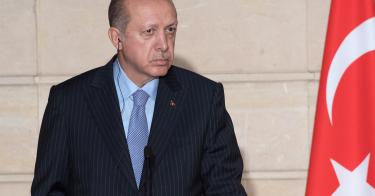All is not well with U.S.-Turkey relations. Earlier this month, President Recep Tayyip Erdogan bitterly criticized U.S. support for Syrian Kurdish militias, saying: “A country we call an ally is insisting on forming a terror army on our borders. … Our mission is to strangle it before it’s even born.”
He even threatened attacks on U.S. special operations forces working with the militias: “Don’t force us to bury in the ground those who are with terrorists.”
Coming from the leader of a longtime NATO member, the statements were especially shocking. They expose Mr. Erdogan’s deep anti-American bias and reflect the degree to which he has led Turkey away from the West.
Since rising to power in 2003, the prickly and belligerent Mr. Erdogan has clashed frequently with Washington, the European Union and Israel (formerly a regional ally). Turkey has devolved from ally to frenemy.
Tensions between Washington and Ankara are rising over Syria. Although both countries oppose the brutal regime of Syrian dictator Bashar Assad, they have very different strategies for ousting him from power.
Turkey has worked closely with Syrian rebel factions aligned with the Muslim Brotherhood and other Islamists, initially turning a blind eye to the rise of the Islamic State. The U.S., although hostile to the Assad regime, put a higher priority on defeating Islamic State.
After a botched effort to arm and train Arab rebel factions, Washington turned to Syrian Kurds to do most of the ground fighting against Islamic State inside Syria. It deployed hundreds of special operations forces with the People’s Protection Units, a militia known by the Kurdish initials YPG, and backed them with air, artillery, reconnaissance, intelligence and logistical support.
The Syrian Kurdish militia, backed by the U.S., made steady progress against Islamic State and pushed it out of most of its strongholds in eastern Syria last year.
But Mr. Erdogan sees Syria’s Kurds as more of a threat than Islamic State, denouncing the YPG militia as an extension of the Kurdistan Workers’ Party (PKK), a Kurdish separatist group in eastern Turkey. The U.S. considers the PKK to be a terrorist organization but sees the YPG as a separate entity.
Mr. Erdogan was infuriated when the Pentagon announced it would extend indefinitely the deployment of U.S. troops in northeastern Syria and build a security force of 30,000 local Syrians — including many YPG fighters — to prevent an Islamic State resurgence. That was what sparked his intemperate remark about “burying” U.S. troops.
On Jan. 20, Turkish troops crossed the border to attack a Syrian Kurdish enclave surrounding the city of Afrin in northwestern Syria. Turkey has announced its desire to carve out a 20-mile-deep security zone on the Syrian side of the border.
The Turks expect a short and easy campaign. They received a green light from Moscow, which has pulled its troops from the area and allowed Turkish warplanes to bomb Kurdish positions in Afrin. Turkey also knows that the YPG forces in Afrin do not enjoy U.S. backing, which was reserved for YPG forces farther east that were actively fighting Islamic State.
But if the Afrin campaign goes well, a Turkish offensive to take the city of Manbij, defended by YPG forces backed by U.S. troops, could be next.
Mr. Erdogan repeatedly has fanned the flames of anti-American xenophobia. He accused Washington of backing the failed 2016 military coup against his government and of protecting Fethullah Gulen, the exiled former political ally whom Mr. Erdogan blames for the coup.
Mr. Erdogan has exploited the failed coup to justify a massive purge. He has arrested more than 50,000 people and fired roughly 150,000 from their jobs, ostensibly because they supported the coup.
Now he risks a clash with his strongest foreign ally — the U.S. — inside Syria. If and when that happens, you can bet that the wily Turkish president will also exploit that crisis to further consolidate his political power.
This piece originally appeared in The Washington Times



